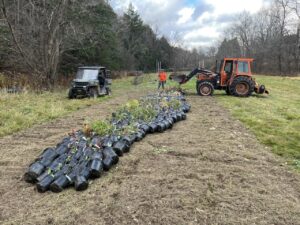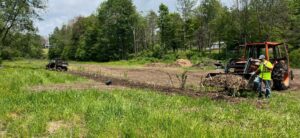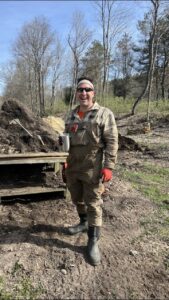Exchanging the Challenges of Military Service for the Challenges of Learning about Horticulture
Tyler Evans explored what it meant to be part of the U.S. Marine Corps, and he lived with a mindset to defeat the challenges that hinder progress. After completing his service, he explored and now works with nature to challenge himself and progress to build an agricultural business.
When Marine Corps veteran, Tyler Evans, left military service, his first ambition was not to grow plants. He focused on getting settled into his community and working to support his new life outside of the military. Not long after he arrived in Walton, NY, he began exploring the landscape around him and found a passion for learning about the plants and wildlife on his property. A personal value to develop his land for wildlife soon became a primary focus.
As he began actively managing his property and discovering new plant life, he set out on a mission to learn the various plant propagation methods and use them to grow his own.
“I love trying to understand how nature works, and how little we really know about it,” Tyler said as he looked out over the landscape he has begun to transform. “The most rewarding part of farming is taking risk and putting in countless hours of work planting and propagating, and then watching the result of my work, improving the process, and starting another iteration. There is something mentally and spiritually rewarding about working with the soil; it’s meditative.”

Tyler putting the potted plants to bed for winter 2022.
As Tyler’s enthusiasm grew, so did his desire to sell some of his plants and help others develop their property landscape, leading to formation of Brookside Plant Farm.
“Brookside Plant Farm is still in early development,” Tyler explained. “In 2023, I focused on planting the majority of my ‘parent’ species, which can be propagated by cuttings, or otherwise easily reproduced. The next phase will be to perfect the art of propagation, followed by marketing and bringing product to market. I’m currently working on about 2 acres but will soon be expanding to another area of the property.”
As with any farm start up, Tyler experienced challenges.
“I don’t know if anyone feels truly qualified or prepared to start farming,” Tyler shared. “I believe I will never stop learning, and I might as well start where I stand.”
One of his biggest challenges was deciding what to work on and when. Remembering back to his days in the military, he began taking a familiar approach. He started his day by looking at the weather and conditions on the land and deciding what those conditions would permit him to accomplish. He then set his priorities of work and gathered his equipment, accomplishing one task at a time, and over time, building momentum and a rhythm similar to the ‘battle rhythm’ our NCOs established to keep our unit trained and functional.

Tyler mulching with his dad, David.
“Another challenge for me was what I call ‘analysis paralysis’. Analysis paralysis occurs when I think too long about the right way to do something, instead of thinking, deciding, then acting,” Tyler explained. “I had to learn to accept that I am going to make mistakes; they can’t be avoided. I focus on learning from my mistakes, instead of stressing over them, and committing to not repeating them. I decided that I won’t expect myself to do anything perfectly, but I do expect myself to do it, enjoy it, and learn from it.”
Tyler, like most veterans, did not have a farming background. He started like many of us, researching and self-learning. He took his ideas and made an appointment with the NY Small Business Development Center (SBDC), and a business advisor assisted him in writing his business plan.
“I am not sure I would have gotten a business plan written if it was not for their support” Tyler said. “The advisor held me accountable yet supported me every step of the way. I have not needed to use my business plan to secure funding yet, but it was an excellent thought exercise for me.”

Marine Corps veteran, Tyler Evans, potting up plants on a sunny spring day 2022!
As Tyler talked about his farm start up tasks, he emphasized taking the time for research: “I don’t want to say there’s a right or wrong way to approach a business startup, but for me researching the resources available, particularly available to veterans, is what I consider a worthy upfront investment of your time,” he said. His research not only led him to the NY SBDC, but also led him into obtaining free support in the designing of his logo and his website.
Tyler’s research also led him to the Cornell Small Farms Program (CSFP) and Farm Ops, the CSFP Veterans in Agriculture project. He attended veteran in-person and virtual trainings, and he received a scholarship for CSFP online courses.
“Farm Ops has provided an opportunity to network with other Veteran farmers and learn critical skills at the same time,” Tyler shared. “The experience and knowledge shared by presenters at Farm Ops events is outstanding and has contributed directly to operations improvements at Brookside Plant Farm.”
These opportunities provided Tyler the opportunity to make veteran connections based on shared military experiences and a shared interest in farming. He hopes his story inspires other veterans on the edge of pursuing activities related to horticulture or agriculture.
“Jump in and challenge yourself, even if it means just starting a small garden in the corner of your yard,” Tyler said. “We all have to start where we stand.”
Tyler encourages other farmer veterans to share their experiences: “I hope other farmer veterans take the time to help another veteran. We must invest in our veteran community.” His military experiences have shown him what is possible when a group of individuals come together with a common purpose and goal.
“We can do more together than we can apart,” Tyler emphasized. “It is amazing what we can bring to life with just a little effort”.

